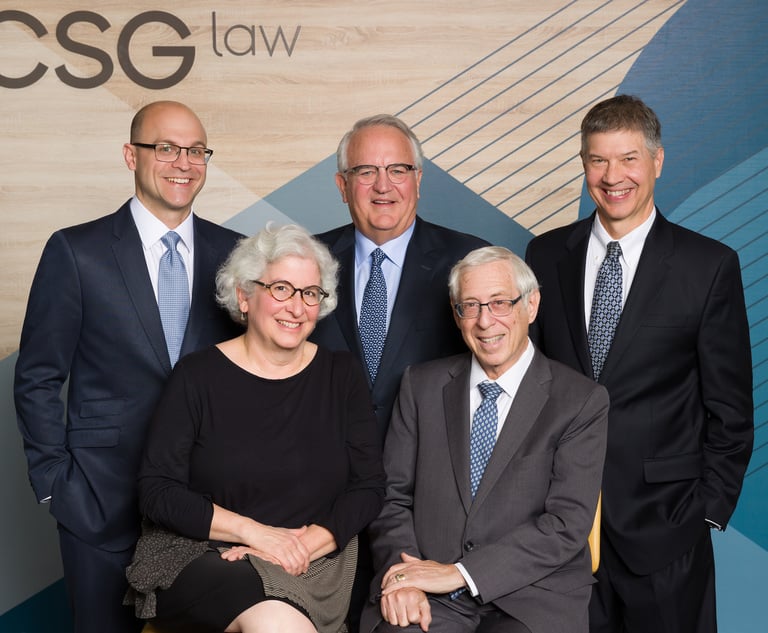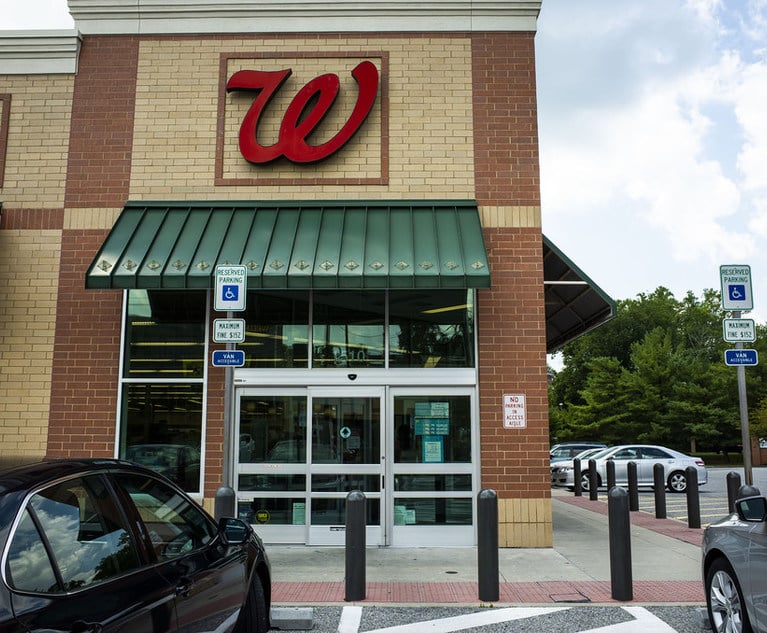 New Jersey Statehouse in Trenton
New Jersey Statehouse in TrentonBill to Shorten Malpractice Filing Period Passes Assembly Judiciary Committee
A-4880 was voted out of committee just before noon after a lively debate among both sides as to whether the consumer would ultimately benefit or suffer as a result of such changes.
March 18, 2019 at 04:16 PM
5 minute read
A measure that would shorten the statute of limitations for malpractice claims against certain licensed professionals, including attorneys, from six years to two years, passed the Assembly Judiciary Committee on Monday in Trenton.
The measure also would limit fee-shifting in such cases.
Under A-4880, malpractice suits against licensed accountants, architects, engineers and land surveyors would also have to be filed within two years, and attorney fees could not be awarded in any action against these professionals except under certain circumstances.
A-4880 was voted out of committee just before noon after a lively debate among both sides as to whether the consumer would ultimately benefit or suffer as a result of such changes.
“This legislation is about fairness,” said Evelyn Padin, president-elect of the New Jersey State Bar Association, after the Assembly Judiciary voted 4-0-2 in favor of the measure. “It will have a direct impact on small business owners like myself. It is the difference between whether we can provide for our families or continue to struggle … This is an important step in leveling the playing field for professionals. The NJSBA will continue to work vigorously in support of seeing this become law.”
The bill now advances to a floor vote in the Assembly.
S-2264, the Senate companion bill, is awaiting a reading in the Senate Judiciary Committee.
Monday marked a break from the past on the controversial proposal. Identical versions of the bill have been proposed in previous legislative sessions, but all failed to gain traction.
Voting in the favor of the bill on Monday were: Assembly Judiciary Commitee Chairwoman and A-4880's primary sponsor, Annette Quijano (D-Union), Vice-chair Carol Murphy (D-Burlington), Assemblyman Gordon Johnson (D-Bergen), and Assemblyman William Spearman (D-Camden).
Assemblywoman Serena DiMaso (R-Monmouth) and Assemblyman Michael Patrick Carroll (R-Morris) were the two abstensions.
“This bill is critically important,” said John E. Keefe Jr., current president of the 18,000-member New Jersey State Bar Association—the first to testify before the committee. “It will improve a broken insurance market, provide a level playing field for licensed professionals, and,of critical importance—and contrary to what you have heard today—it will provide substantial protection and better protection for New Jersey consumers than currently exists.”
Keefe said malpractice insurance has gotten so cost-prohibitive in New Jersey because the state's six-year statute of limitations was longer than neighboring states, including New York, which discourages insurance carriers from doing business in the state. He said of about 25 insurance carriers in New Jersey, only seven were writing and renewing malpractice policies.
“Pricing lawyers out of the insurance market is what really hurts consumers,” he said.
But vigorously countering Keefe's assessment of A-4880's effect was Lynne M. Kizis, president of the New Jersey Association for Justice, the state's principal plaintiffs bar group.
Kizis, a partner at Wilenz, Goldman & Spitzer of Woodbridge, said the bill “tips the scales of justice to the side of the lawyer, the engineer, the architect … the licensed professional and away from the consumers.”
“When an organization defines its position on a piece of legislation, it is defining Itself,” she told the committee. “A-4880 is about giving a legal advantage to licensed professionals, including lawyers, who have committed professional malpractice while representing a consumer who has put their trust in them.”
Malpractice lawsuits against health-care professionals already are governed by a two-year statute of limitations.
Those in favor of A-4880 said it would overturn the Saffer v. Willoughby doctrine from the state Supreme Court's 1996 ruling in that case, which permits the awarding of counsel fees—known as “Saffer fees”—to plaintiffs who are successful in malpractice claims.
A-4880—similar to previous bills before it—would have malpractice claims governed by the so-called “American Rule,” in which all parties generally are responsible for their own legal costs. The State Bar is arguing that the Saffer rule discourages settlement since plaintiffs lawyers would prefer to pursue litigation in an effort to obtain a fee award.
But plaintiff attorneys claim the provision gives harmed individuals their only chance to become whole by being able to recover legal fees and costs.
“Awarding attorney fees and costs to the victim of professional negligence is not fee shifting,” testified Eric G. Kahn, immediate past president of NJAJ, who appeared alongside Kizis. “Rather, it is a necessary element of a claimant's damages in order to make that victim whole. It is not contrary to the American Rule. The goal should be to protect the consumer, the victim of the professional negligence or malpractice, and not the professional who harmed the consumer—to make that harmed individual whole.”
But Jack Chan, a practicing attorney in Englewood Cliffs, and president of the Asian Pacific American Lawyers Association of New Jersey, testified that owners of small firms simply can't afford malpractice insurance in the present market. Chan said he opened his solo practice five years ago and was among the 90 percent of law firms in New Jersey with five or fewer lawyers.
“Attorneys should not have to decide whether they should pay their malpractice premium or meet payroll for their staff,” Chan told the committee. “They should never have to weigh paying their rent or paying for coverage.”
This content has been archived. It is available through our partners, LexisNexis® and Bloomberg Law.
To view this content, please continue to their sites.
Not a Lexis Subscriber?
Subscribe Now
Not a Bloomberg Law Subscriber?
Subscribe Now
NOT FOR REPRINT
© 2024 ALM Global, LLC, All Rights Reserved. Request academic re-use from www.copyright.com. All other uses, submit a request to [email protected]. For more information visit Asset & Logo Licensing.
You Might Like
View All
Appellate Div. Follows Fed Reasoning on Recusal for Legislator-Turned-Judge
4 minute read
Chiesa Shahinian Bolsters Corporate Practice With 5 From Newark Boutique
5 minute read
'A Mockery' of Deposition Rules: Walgreens Wins Sanctions Dispute Over Corporate Witness Allegedly Unfamiliar With Company
Trending Stories
- 1The Pusillanimous Press
- 2Contract Lifecycle Management Company ContractPodAi Unveils Leah Drive
- 3'Great News' for Businesses? Judge Halts Transparency Mandate
- 4Consilio Announces ‘Native AI Review,’ Expanding Its Gen AI E-Discovery Offerings
- 5Federal Judge Hits US With $227,000 Sanction for Discovery Misconduct
Who Got The Work
Michael G. Bongiorno, Andrew Scott Dulberg and Elizabeth E. Driscoll from Wilmer Cutler Pickering Hale and Dorr have stepped in to represent Symbotic Inc., an A.I.-enabled technology platform that focuses on increasing supply chain efficiency, and other defendants in a pending shareholder derivative lawsuit. The case, filed Oct. 2 in Massachusetts District Court by the Brown Law Firm on behalf of Stephen Austen, accuses certain officers and directors of misleading investors in regard to Symbotic's potential for margin growth by failing to disclose that the company was not equipped to timely deploy its systems or manage expenses through project delays. The case, assigned to U.S. District Judge Nathaniel M. Gorton, is 1:24-cv-12522, Austen v. Cohen et al.
Who Got The Work
Edmund Polubinski and Marie Killmond of Davis Polk & Wardwell have entered appearances for data platform software development company MongoDB and other defendants in a pending shareholder derivative lawsuit. The action, filed Oct. 7 in New York Southern District Court by the Brown Law Firm, accuses the company's directors and/or officers of falsely expressing confidence in the company’s restructuring of its sales incentive plan and downplaying the severity of decreases in its upfront commitments. The case is 1:24-cv-07594, Roy v. Ittycheria et al.
Who Got The Work
Amy O. Bruchs and Kurt F. Ellison of Michael Best & Friedrich have entered appearances for Epic Systems Corp. in a pending employment discrimination lawsuit. The suit was filed Sept. 7 in Wisconsin Western District Court by Levine Eisberner LLC and Siri & Glimstad on behalf of a project manager who claims that he was wrongfully terminated after applying for a religious exemption to the defendant's COVID-19 vaccine mandate. The case, assigned to U.S. Magistrate Judge Anita Marie Boor, is 3:24-cv-00630, Secker, Nathan v. Epic Systems Corporation.
Who Got The Work
David X. Sullivan, Thomas J. Finn and Gregory A. Hall from McCarter & English have entered appearances for Sunrun Installation Services in a pending civil rights lawsuit. The complaint was filed Sept. 4 in Connecticut District Court by attorney Robert M. Berke on behalf of former employee George Edward Steins, who was arrested and charged with employing an unregistered home improvement salesperson. The complaint alleges that had Sunrun informed the Connecticut Department of Consumer Protection that the plaintiff's employment had ended in 2017 and that he no longer held Sunrun's home improvement contractor license, he would not have been hit with charges, which were dismissed in May 2024. The case, assigned to U.S. District Judge Jeffrey A. Meyer, is 3:24-cv-01423, Steins v. Sunrun, Inc. et al.
Who Got The Work
Greenberg Traurig shareholder Joshua L. Raskin has entered an appearance for boohoo.com UK Ltd. in a pending patent infringement lawsuit. The suit, filed Sept. 3 in Texas Eastern District Court by Rozier Hardt McDonough on behalf of Alto Dynamics, asserts five patents related to an online shopping platform. The case, assigned to U.S. District Judge Rodney Gilstrap, is 2:24-cv-00719, Alto Dynamics, LLC v. boohoo.com UK Limited.
Featured Firms
Law Offices of Gary Martin Hays & Associates, P.C.
(470) 294-1674
Law Offices of Mark E. Salomone
(857) 444-6468
Smith & Hassler
(713) 739-1250







